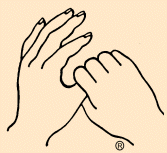

Theoretical Physicists have made observations about time, concluding that it is speeding up. As the universe expands, time speeds up. Well, for those of us down here on the street, that's a no-brainer. Every year, every month, every week, sometimes seems like a break-neck rush from one crucial task to another. If we can keep--or find--our sense of humor through it all, and gain a moment of perspective, we might realize that even
one minute of ceasing all activity, or
one minute of disengaging from the worries and frustrations created by our expectations, can mean the difference between misery and well-being.

It is in this spirit of calmly sitting in the eye of the hurricane of our lives that I offer well-tested, scientifically sound techniques you can apply on yourself to reduce pain, eliminate worry, restore equilibrium and bring back that natural state of well-being. I use them daily myself, and have never seen them fail (provided I actually take that
one minute and apply them!).

Some of these techniques come from ancient spiritual practices, others from modern research into human physiology. They take a minimum of discipline to perform, and produce nearly immediate results. You don't have to ingest any substance, rub anything on, or smell anything. And, best of all it's free. Try these practices, and then let me know what your experiences were on the
Forum. Enjoy!
PRACTICE #1 - The Inner Smile

 I first read about this in a book by Taoist Master, Mantak Chia, Awaken Healing Light. The entire book is absolutely fascinating, but this one practice is emphasized as being very important:
I first read about this in a book by Taoist Master, Mantak Chia, Awaken Healing Light. The entire book is absolutely fascinating, but this one practice is emphasized as being very important:
- Smile with your face.
- Then, imagine a smile on your heart. See it beating joyfully and purposefully.
- Get your liver to smile, your stomach, lungs, intestines, brain.
- Now find a discomfort, pain or tightness. Make it smile. You will notice this act seems to relax the area and the area around it.
- Now breathe slowly into the area.

This immediately allows energy to flow through and past the blockages causing the discomfort, and, most importantly, causes an awareness of tension and the thinking that created it.
PRACTICE #2 - Take it Away

 I discovered this phenomenon on my own after doing the Inner Smile consistently in yoga class. I'm speculating as to why it works, and at this point am thinking that pains and discomforts are really the body's attempts at reaching out for relief. All that is necessary, apparently, is to grant relief from a forgiving, smiling space.
I discovered this phenomenon on my own after doing the Inner Smile consistently in yoga class. I'm speculating as to why it works, and at this point am thinking that pains and discomforts are really the body's attempts at reaching out for relief. All that is necessary, apparently, is to grant relief from a forgiving, smiling space.
- Make the pain-discomfort-fear-worry or unwanted emotion smile.
- See the condition as a shape. It has a form--it can be a blob, a structure, any shape.
- Now, calmly smiling, gently say to yourself, "Take it away."
- Observe it leaving.

The Taoists and Buddhists say that there is no heirarchy of tasks. In other words, the flapping butterfly wings are as significant as an erupting volcano, or moving a mountain and moving your little finger are really the same order of magnitude. Motion is motion. It is merely the rearrangement of surfaces. Our assignment of difficulty or ease is an arbitrary and thus illusory habit of mind, thus, the more it hurts, the more severe must be the cause.

This concept is important because it factors in to this practice. If nothing else, this practice will teach you that a mildly stiff back and a sharp, stabbing pain in the knee are just different shapes of the same thing: the body's request for relief. I have noticed that whether it is a mild discomfort or worry, or a sharp pain, the time it takes to dispel it seems to have nothing to do with intensity, so I'm quite sure that is completely arbitrary. Experiment with it.

I've also gotten definite signals or requests to do something to accompany the Taking Away, such as "drink water," or "eat a grapefruit," or "breathe deeply"--probably to help re-normalize the system.
PRACTICE #3 - Jumper Cabling

 I discovered this in a practice called Jin Shin Jyutsu ("The Art of the Creator through the person of compassion"), developed in the early 20th Century by Jiro Murai, a Japanese sage. The automotive electrical reference was assigned the practice by Mary Burmeister, the American who was Murai's primary student. Burmeister's late sister, Alice, published the reference book on the art, The Touch of Healing in 1997.
I discovered this in a practice called Jin Shin Jyutsu ("The Art of the Creator through the person of compassion"), developed in the early 20th Century by Jiro Murai, a Japanese sage. The automotive electrical reference was assigned the practice by Mary Burmeister, the American who was Murai's primary student. Burmeister's late sister, Alice, published the reference book on the art, The Touch of Healing in 1997.
 Jin Shin Jyutsu has several levels to it, and can be practiced by a therapist or by a person on themselves. The particular practice of "jumper cabling" involves simply holding a finger of one hand with the other hand. Each finger contains the energy meridians for particular sections of the body. For example, hold the thumb to assist with digestion, the index finger for kidneys and lower back, the middle finger for liver functions, the ring finger for respiratory and intestinal conditions, and the little finger for the heart.
Jin Shin Jyutsu has several levels to it, and can be practiced by a therapist or by a person on themselves. The particular practice of "jumper cabling" involves simply holding a finger of one hand with the other hand. Each finger contains the energy meridians for particular sections of the body. For example, hold the thumb to assist with digestion, the index finger for kidneys and lower back, the middle finger for liver functions, the ring finger for respiratory and intestinal conditions, and the little finger for the heart.
 The objective with the holding of the fingers is to continue until you feel a definite pulse in both the finger and the hand holding it. This is the signal that energy is flowing through the respective organs. The time it takes to feel the pulse can be anywhere from immediately to 10 minutes in my experience. Plus, when the pulses get going, a wonderful, warm, throbbing sensation can be felt throughout the body.
The objective with the holding of the fingers is to continue until you feel a definite pulse in both the finger and the hand holding it. This is the signal that energy is flowing through the respective organs. The time it takes to feel the pulse can be anywhere from immediately to 10 minutes in my experience. Plus, when the pulses get going, a wonderful, warm, throbbing sensation can be felt throughout the body.
 Use this practice with #1 and #2 above for quite a revelation.
Use this practice with #1 and #2 above for quite a revelation.
PRACTICE #4 - The Heart Lock-In™
 I found out about this practice during a lecture by Gregg Braden a few years ago, and it's stuck with me since. Braden presented fascinating information developed by the HeartMath Institute. Founded by Lew "Doc" Childre in the early 90s, the Institute has done exhaustive research on the psycho-physiological connection between the heart and the brain, and has developed a biofeedback device for teaching how to consciously control heart rate that then changes brain chemistry.
I found out about this practice during a lecture by Gregg Braden a few years ago, and it's stuck with me since. Braden presented fascinating information developed by the HeartMath Institute. Founded by Lew "Doc" Childre in the early 90s, the Institute has done exhaustive research on the psycho-physiological connection between the heart and the brain, and has developed a biofeedback device for teaching how to consciously control heart rate that then changes brain chemistry.
 From this reserach has come a wonderfully simple and non-mysterious technique based on yogic breathing, they call "The Heart Lock-in™" (this and much more available on their website in exchange for your email registration):
From this reserach has come a wonderfully simple and non-mysterious technique based on yogic breathing, they call "The Heart Lock-in™" (this and much more available on their website in exchange for your email registration):
1. Shift your attention to the area of your heart and breathe slowly and deeply. Heart Breathing helps draw the energy out of the head, where negative thoughts and feelings are amplified. Remember, breathe slow and deeply in a casual way. Imagine the air entering and leaving through the center of your chest and heart area.
2. Activate and sustain a genuine feeling of appreciation or care for someone or something in your life.
3. Send these feelings of care toward yourself and others. This benefits them and especially helps recharge and balance your own system.
 When you catch your mind wandering during a Heart Lock-In, no big deal, simply refocus your attention on the heart area and reconnect with feelings of care or appreciation. When you sustain coherence for 5 minutes or more it makes the state more familiar and accessible to you when you need it to meet challenges of stress. With practice, the coherent state becomes your new reference point, making the experience more automatic.
When you catch your mind wandering during a Heart Lock-In, no big deal, simply refocus your attention on the heart area and reconnect with feelings of care or appreciation. When you sustain coherence for 5 minutes or more it makes the state more familiar and accessible to you when you need it to meet challenges of stress. With practice, the coherent state becomes your new reference point, making the experience more automatic.

An intriguing aspect to the research of the HeartMath Institute is that it was found that the heart actually has a
brain of its own--actual brain matter (ganglia). It was also found that the heart sends more signals to the brain than the brain sends to the heart. Consequently, during frustration or emotional upset, the heart and the brain can go "out of phase," with the heart beating out of rhythm, creating stress on the whole body system. By bringing the heart rate into a smooth, continous rhythm, the communication to the brain is calm and steady, creating corresponding changes in brain chemistry. This they call "coherence."
Conclusion
 By using these techniques, and teaching them to your family and friends, many of the milder physical symptoms created from stressful modern living can be managed, and most importantly, brought under empowering control. Further, any dietary supplementation you may be using can certainly be enhanced with these practices.
By using these techniques, and teaching them to your family and friends, many of the milder physical symptoms created from stressful modern living can be managed, and most importantly, brought under empowering control. Further, any dietary supplementation you may be using can certainly be enhanced with these practices.
 So, take that one minute in the middle of the day, or that five minutes before getting out of bed--and certainly at bedtime--and use these practices to learn about your body-mind connection, and your inherent right to your own well-being.
So, take that one minute in the middle of the day, or that five minutes before getting out of bed--and certainly at bedtime--and use these practices to learn about your body-mind connection, and your inherent right to your own well-being.




 I found out about this practice during a lecture by Gregg Braden a few years ago, and it's stuck with me since. Braden presented fascinating information developed by the HeartMath Institute. Founded by Lew "Doc" Childre in the early 90s, the Institute has done exhaustive research on the psycho-physiological connection between the heart and the brain, and has developed a
I found out about this practice during a lecture by Gregg Braden a few years ago, and it's stuck with me since. Braden presented fascinating information developed by the HeartMath Institute. Founded by Lew "Doc" Childre in the early 90s, the Institute has done exhaustive research on the psycho-physiological connection between the heart and the brain, and has developed a